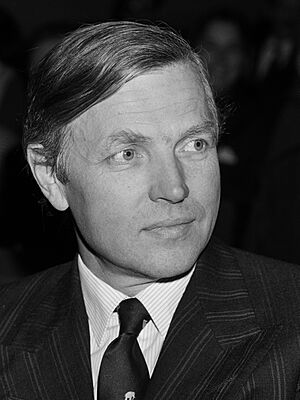Paul Fentener van Vlissingen facts for kids
Paul Fentener van Vlissingen (born March 21, 1941, in Utrecht – died August 21, 2006, in Langbroek) was a Dutch businessman and a kind-hearted giver. He led a big company called SHV Holdings for many years. Paul helped create special areas for wildlife in Africa and bought a large piece of land in Scotland called Letterewe. He was famous for letting people freely explore his land, even before a law in Scotland made it a right for everyone.
Contents
Early Life and Family Business
Paul Fentener van Vlissingen was the youngest son of Frits Fentener van Vlissingen II. His family was a very important industrial family in the Netherlands. Their wealth started in the 1800s by shipping coal on the Rhine river. Paul's father helped start SHV Holdings in 1896 by joining forces with eight other Dutch trading families. SHV was once the biggest coal wholesale business in Europe. Today, it is the largest company in the Netherlands that is still owned by a private family.
Leading SHV Holdings
Paul inherited a large share of the company SHV Holdings from his father. He studied economics at the University of Groningen before joining SHV. In 1974, he joined the company's board. Then, in 1980, he took over from his brother, Frits III, as the chairman.
Paul led SHV as its chief executive for about 30 years, starting in the mid-1960s. Under his leadership, the company started doing business in many new areas. This happened before the coal market became less important in the 1960s. He got involved in retail, which means selling things to customers. This included stores like Makro and Otto Reichelt supermarkets. He also moved into energy by buying companies that sold liquefied petroleum gas (LPG), like Calor Gas in the UK. He also explored other areas like recycling, oil, and renewable energy. In 1995, he stepped down from his main role but continued as a non-executive chairman.
Paul Fentener van Vlissingen had a unique and thoughtful way of leading. He gave young managers a lot of freedom to set up Makro stores in other countries. He also understood the danger of global warming very early, in the 1990s. He loved to share wise sayings. In 2001, he wrote a book about his business experiences called Ondernemers zijn ezels, which means Entrepreneurs are Jackasses. He wrote another book in 2002 called Overstekende ezels, or Crossing Jackasses. In this book, he shared his ideas about business leaders, honesty, and success.
Helping Nature and People
Paul Fentener Van Vlissingen was known as a great supporter of nature. He helped develop wildlife reserves in Scotland, South Africa, Malawi, Zambia, and Ethiopia. In 1978, he bought the wild Letterewe estate in Wester Ross, Scotland. This land was about 85,000 acres and had no roads. In 2006, he was called the biggest foreign landowner in Scotland. He once said about Letterewe, "I don't call myself the owner. You can't own a place like this. It belongs to the planet. I'm only the guardian of it."
He created an agreement called the Letterewe Accord. This agreement allowed hikers to freely access his entire estate. In return, they promised to respect the land. This agreement was made more than ten years before Scotland passed its own right-to-roam law. He was known for inviting everyone, from other landowners to journalists and birdwatchers, to visit his estate. He would talk with them face to face about important issues. Sometimes, he would pack supplies on a pony and disappear into the hills for a week. He would stay in a simple shelter called a bothy without lights or a toilet. He also suggested bringing back wolves and lynx to his estate.
After a serious illness in 1980, he started the Van Vlissingen Cancer Fund. This fund is now one of the main groups that raises money for cancer research in the Netherlands. From 1994 until he passed away, his home was the Conholt Park estate in England. There, he also practiced sustainable land management and helped protect nature.
Van Vlissingen also strongly supported Scottish Gaelic, which is a language spoken in Scotland. In 2006, he gave £250,000 to Sabhal Mòr Ostaig, a Gaelic college on the Isle of Skye.
His Final Years and Legacy
In April 2006, Paul van Vlissingen announced that he had terminal pancreatic cancer. He decided not to have chemotherapy. He said, "In the Western world we mistakenly try to keep death at bay. I look to Native Americans instead. When they see their death approaching, they visit good friends and family to share happy memories and look back at the good things."
In an interview in April 2006, he shared his concerns about the environment. He said, "Our planet is in a much sorrier state than it was when I was a child. The destruction cannot go on at this pace. My generation should be ashamed of the condition in which we are passing on our planet to future generations."
He passed away on August 21, 2006. The news of his death was shared with the public the next day.
Paul Fentener van Vlissingen left most of his wealth and the Letterewe Estate in Scotland to his two daughters, Alicia and Tet, and their children. His eldest brother, Frits III, passed away in March 2006. His middle brother, John, is the last of the three brothers still alive.
 | Selma Burke |
 | Pauline Powell Burns |
 | Frederick J. Brown |
 | Robert Blackburn |


